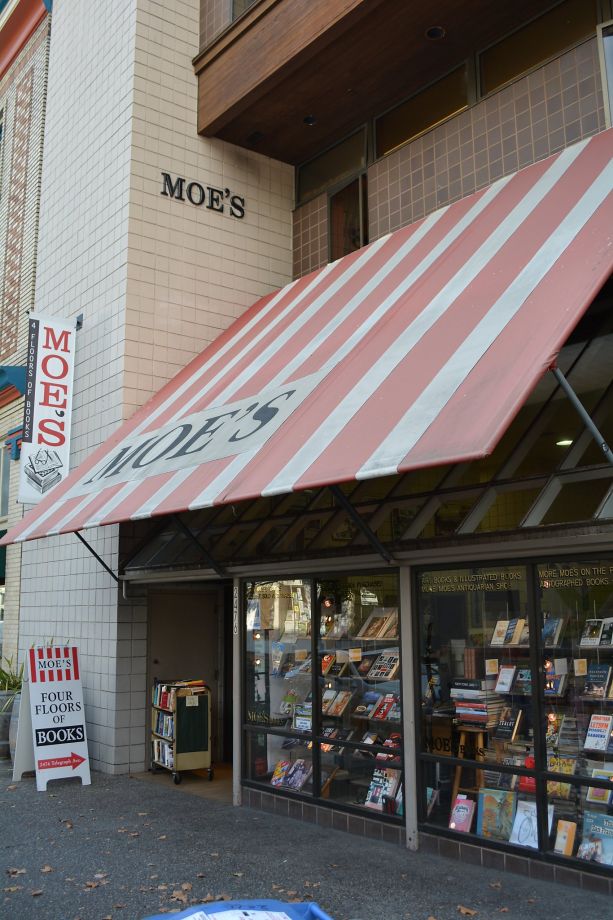Van filled with $350,000 rare books stolen in Oakland

Van filled with $350,000 rare books stolen in Oakland
Source: SFGate
By Jenna Lyons Published 4:51 pm, Friday, February 19, 2016
A man had a van with $350,000 worth of valuable books stolen from outside an Oakland home. It’s believed the men went to Moe’s Books in Berkeley to try to sell a few thousand dollars worth in novels.
Photo: John McMurtrie
A man had a van with $350,000 worth of valuable books stolen from outside an Oakland home. It’s believed the men went to Moe’s Books in Berkeley to try to sell a few thousand dollars worth in novels.
He’s been in the book dealing business for more than 15 years, but Lawrence Van De Carr said he’d never come across such a jewel of a title: a mint copy of Isaac Asimov’s 1950 classic “I, Robot” valued at $8,500. That novel, once a prized possession of Van De Carr’s, is now gone, along with around 400 of his other books worth well over $350,000. Someone stole his van filled with boxes of rare books while it was parked outside a friend’s Oakland home this week.
“The thing about that book is it was as new as the day it was published. Just a perfect, perfect copy. It glistened,” Van De Carr lamented.
“It’s my livelihood, it’s how I make a living,” added Van De Carr, owner of Bootlegger’s Books in Chicago. “Now, I have nothing.”
One suspect has been arrested, he said, but his van filled with novels penned by Faulkner, Hemingway and Cormac McCarthy, among other famous authors, has not been found.
Van De Carr has spent more than a decade making several visits to the Bay Area for annual book fairs. Two every February, and two in every October. He just attended fairs in San Mateo and Pasadena, and like always, planned to stay with a friend in Oakland in February, avoiding the harsh winter in Chicago for at least a short while. He said he parked his silver 2008 Ford van outside his friend’s home Monday afternoon. But when he went outside Tuesday morning, it was gone.
First he called the Antiquarian Booksellers Association of America. The group sent out a warning to its network of book dealers to be on the lookout for the stolen books.
Van de Carr said he called Oakland police around 11 a.m. Monday to report the theft.
“Everyone was on the lookout for these books and sure enough someone showed up four hours later,” he said. Joshua Anderson, 30, went to Moe’s Books in Berkeley shortly after the bookseller’ association sent out an alert. He and an alleged accomplice had four books, valued around $14,000, that they were trying to sale, said John Wong, manager at the store.
Among the classic first-edition they were trying fence were “A Hornbook for Witches: Poems of Fantasy” by Leah Bodine Drake, one of only 563 known copies; “No Country for Old Men” by McCarthy, “Always Comes Evening” by Robert E. Howard, and “Pylon” by William Faulkner. The men said they got the valuable volumes from a deceased uncle, but Anthony, one of Wong’s employees, wasn’t buying it. “Anthony was suspicious because they had said they were left by their uncle,” Wong said, adding that he and his employees had just been made aware of the stolen books when the pair walked into Telegraph Avenue store.
Anthony, who did not want his last named used, stalled the men by sending them up to the fourth-floor rare books section, while he called police. When officers arrived, one of the men escaped through a back door, but Anderson ran out through the front, where he was caught and arrested, Wong said.
Alameda County Sheriff’s Office online records show a man with the same name was arrested in Berkeley Tuesday on suspicion of making a false check and appropriating loss property, among other charges. Oakland Police would not comment on the case and Berkeley Police were not immediately available.
“We’re probably the largest open book shop in the Bay Area,” Wong said. “It’s probably natural they would have come here.”
The second man has yet to be apprehended, but he might still be trying to sell the books. Van de Carr said that after Anderson was arrested, he got a call from an El Cerrito bookstore reporting a man was there trying to sell rare books. He said he recognized the titles as those from this stolen van.
Now, Van de Carr, still without his car, is stranded in the Bay Area. He said he will wait until the end of the month before deciding whether to rent a car or fly back to Chicago. Police throughout the Bay Area have their eyes peel for Van de Carr’s 2008 silver Ford van with the Illinois license plate number E-91496.





